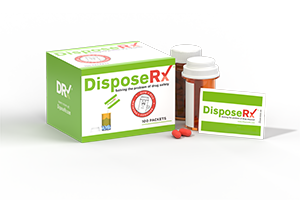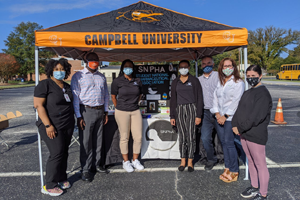 DisposeRx Board Member, Kelly J. Clark, MD, MBA, DFAPA, DFASAM, is also Vice Chair of Caring for Patients During the COVID-19 (CPDC) Task Force of the American Society of Addiction Medicine (ASAM). She and other fellow task force members have worked diligently over the past seven weeks to develop guidance resources for clinicians to use in their practices as they treat patients with addiction while also navigating an unprecedented pandemic. Here are Kelly’s thoughts:
DisposeRx Board Member, Kelly J. Clark, MD, MBA, DFAPA, DFASAM, is also Vice Chair of Caring for Patients During the COVID-19 (CPDC) Task Force of the American Society of Addiction Medicine (ASAM). She and other fellow task force members have worked diligently over the past seven weeks to develop guidance resources for clinicians to use in their practices as they treat patients with addiction while also navigating an unprecedented pandemic. Here are Kelly’s thoughts:
What does your work with the ASAM Task Force entail?
“I was actually on vacation on a cruise ship when COVID-19 started forcing the shutdowns of cities and states across the country. Those of us who specialize in addiction medicine knew the potential implications of quarantining in place and social distancing for our patients, and we feared the impact it would have on them and the ways they seek treatment and support. All of us on the Task Force are volunteers, and we have been reviewing and processing state and federal policies and guidelines as soon as they are published as well as getting information from members practicing in the field. Then we synthesize the information and build resources for clinicians to use as they adapt to this changing world.”
What are your major concerns?
“We are still early in this pandemic, but in the very initial days, I was most concerned about the densely-populated hard-hit communities such as New York City. I worry about those in residential treatment facilities, as well as the homeless and incarcerated. I worry about patients unable to get to doctor appointments and those without the access to technology to engage in virtual visits. I am concerned about outbreaks in all settings and how we were going to run parallel tracks for the infectious and non-infectious. Further, I know that hospital administrators are being forced to consider closing their behavioral and psychiatric units to make room for COVID-19 patients. And primarily, I am concerned that the public thinks of the early spike in New York, Detroit, Miami, and New Orleans as a hurricane that has passed and that they can now leave their homes, clean up and get back to normal. This is a pandemic, and people are going to be spending much more time at home than they seem to understand yet.”
In your experience, what has the impact of previous economic downturns been on patients suffering from substance use disorder?
“Economic stress—actually all stress—can cause an increase in alcohol, prescription drug or illicit drug use. The longer this pandemic goes on and that people face this crisis, the greater the impact will be. This is a time of immense stress, and people without prior addiction often utilize substances to temporarily mask emotional discomfort. I fear that the impact on our country’s drug misuse endemic will be profound and that deaths of despair will increase dramatically.
It is important to remember that opioids alone have not been the only medications involved in either prescription drug addiction or fatal overdoses. Sedating medications of all kinds, from anti-anxiety and sleeping pills to some anti-seizure medications and muscle relaxants, are all too commonly in the home medicine cabinets and seen on overdose autopsies.”
How are patients coping without traditional support, such as community or group meetings?
“The medical approach is to help people remain physically isolated as much as possible while we learn about the disease and build the needed medical and public health infrastructure. So, patients are being seen less often and clinicians are using telephonic and telehealth sessions for assessments and treatment in areas where such treatment is reimbursed. Peer meetings for those who suffer from substance use disorders have also become widely available and accessed. There is information on these approaches on the ASAM COVID webpage. We have many reports of previously stable patients relapsing with the increased stress of this time and decreased formal structure of care but also many reports of patients increasing their engagement in peer support and touching base with providers more frequently due to the convenience of virtual interactions. We are working to learn how to best treat and support patients during this stage of the pandemic.”
As an addiction specialist, are there current policies or guidelines that frustrate you?
“Policies are often drafted without full understanding of the people they will most profoundly impact. For instance, some states have chosen to close liquor stores during this time. This is not the time to be risking an increase in alcohol withdrawal emergencies. We must continue to educate about those who suffer from mental health issues and addiction. The more we can prevent opioid overdoses with ongoing medication treatment, the more we can engage patients with virtual visits and encourage their receiving support, the safer we can make our homes and communities, and the better off the patients, their families and neighbors will be. We are going to fight for our people.”
What advice would you like to share with those navigating these uncertain times?
“Listen to the experts—the scientists, such as Dr. Anthony Fauci, and those who have thoroughly studied pandemics for many years, such as Bill Gates. Anticipate that many of the adjustments we have made in the past five or six weeks will be the new norm. Finally, take care of yourself, and take care of your family. Everyone is tired of being at home, and your children are bored. Home safety is of increased importance, as we have seen increase in child poisonings from disinfectants since the outbreak. If you have not done so, I encourage you to clean out your medicine cabinets to remove the risks of diversion and misuse of medications. The last thing we need in this time of unprecedented crisis are more accidental poisonings or new addictions.”



